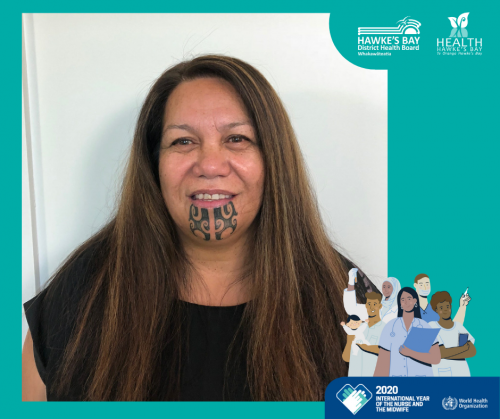
If you had told Kelly Douglas at the commencement of her nursing career in 1980, that she would find a way in which to nurse within a kaupapa Māori framework, she may not have believed you. Nursing in mainstream organisations were embedded firmly in empirical research, a bio-medical model.
But a kaupapa Māori world-view was exactly what she found 20 years into her career, within the kaupapa Māori Mental Health Service at the Hastings hospital campus. “And I knew instantly this was where I was meant to be.”
Using a holistic interconnected approach in her work is as natural as breathing to Kelly. From Ngāti Raukawa, Ngāti Kahungunu and Tainui on her father’s side and Rangitāne and Te Arawa on her mother’s side, Kelly was born and raised in Tokoroa amongst her iwi. Kelly’s whānau, hapū and iwi continued to live and thrive within Te Ao Māori. Presence and connection on a regular basis to the marae was a normal part of life. Traditional healing had always been practiced by her hapū and Kelly considers herself fortunate to have been surrounded by such expert knowledge and skill.
Kelly’s mother was a Registered Nurse, as were two of her maternal aunts. With encouragement from her mother, Kelly applied to the Hawke’s Bay School of Nursing and was successful.
There was a moment mid-career, in 1996, when she almost left nursing to train as a teacher. But her charge nurse at Napier hospital at the time convinced her to “consolidate my knowledge base” by studying at EIT to move from an enrolled nurse to a registered nurse.
As part of that training, she had a student placement with Te Puawai o Te Whanau Oranga Hinegaro kaupapa Māori services. This service was the first kaupapa Māori mental health service for HBDHB. During this time, Kelly discovered a very different world of nursing; one she could relate to and within which she could effect change.
In 2002 Kelly was working for her iwi, Rangitāne when a friend approached her to apply for a position at HBDHB mental health in-patient unit. “I was very, very lucky; there were some amazing people there - clients and staff. We used a team approach that included the client; working together towards wellness. I loved working there and was taught so much by so many.”
Now a member of the multi-disciplinary team covering Mental Health and Addiction Services North (Napier and Wairoa) working with tangata whai ora/clients with moderate to severe mental health and addiction issues, her main focus remains on working with tangata whai ora/client and their whānau/families.
Historically, mental health has long been stigmatised. Kelly uses the analogy of mental health to other enduring illness, for example diabetes. “It can be hard to assure tangata whai ora/clients and their whānau/families that, like other conditions, there is a way forward, that wellbeing can be achieved and that it all starts with taking the first step on the path towards that.”
“You need a goal, you need the person you are working with to think about/formulate the goal; you need them to have the head and heart space that allows them to both set the goal and be ready to work towards it.”
While the work can be challenging, for Kelly the positive results and variety make it well worthwhile. “No two days and no two tangata whai ora/clients are the same. And I’m incredibly fortunate to have found this nursing pathway that can merge so naturally within Te Ao Māori: a holistic way of working with a person on the strong foundation of Te Whare Tapa Whā, the four taha of health and wellbeing, te taha tinana (physical wellbeing), te taha whānau (family and social wellbeing), te taha hinengaro (emotional and mental wellbeing) and te taha wairua (spiritual wellbeing).






Post your comment
Comments
No one has commented on this page yet.